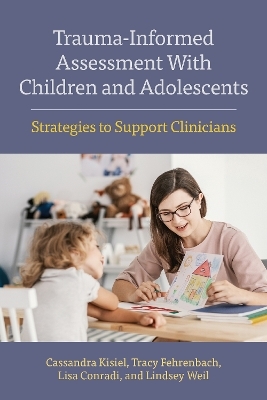
Trauma-Informed Assessment With Children and Adolescents
American Psychological Association (Verlag)
978-1-4338-3385-4 (ISBN)
This book serves as a practical guide for clinicians and other professionals working with children and adolescents exposed to trauma, offering an overview and rationale for a comprehensive approach to trauma-informed assessment, including key domains and techniques.
Building on more than 2 decades of work in collaboration with the National Child Traumatic Stress Network, the authors provide strategies for conducting an effective trauma-informed assessment that can be used in practice to support the treatment planning and intervention process, family engagement and education, and collaboration and advocacy with other providers.
As part of APA's Division 56 series, Concise Guides on Trauma Care, the book surveys a range of recommended tools and considerations for selecting and implementing those tools across stages of development and in relation to a child’s sociocultural context. The authors also examine challenges that may arise in the context of trauma-informed assessment and suggest approaches to overcome those barriers.
Cassandra Kisiel, PhD, is an associate professor and clinical psychologist in the Mental Health Services and Policy Program and the Department of Psychiatry and Behavioral Sciences at Northwestern University Feinberg School of Medicine. She serves as the principal investigator and project director for the Center for Child Trauma Assessment, Services and Interventions, a center of the National Child Traumatic Stress Network, where she is recognized as one of the leading experts in trauma screening and assessment. Dr. Kisiel has written and lectured extensively on the assessment and treatment of children exposed to complex trauma and has supported the implementation of trauma-informed practices across the country. Tracy Fehrenbach, PhD, is a licensed clinical psychologist and assistant professor in the Mental Health Services and Policy Program at Northwestern University Feinberg School of Medicine. She serves as codirector and a co-investigator for the Center for Child Trauma Assessment, Services and Interventions, a Center of the National Child Traumatic Stress Network. For nearly 2 decades, Dr. Fehrenbach has engaged in research focused on improving the effectiveness of trauma-informed treatments for people impacted by interpersonal violence. She has published and regularly lectures on the impact of child maltreatment and complex trauma and provides consultation to an array of organizations. Lisa Conradi, PsyD, is the director of clinical operations at the Chadwick Center for Children and Families at Rady Children’s Hospital-San Diego, where she oversees all clinical programs at one of the largest trauma treatment centers in the nation. Dr. Conradi has authored and coauthored a variety of publications on trauma screening and assessment practices and creating trauma-informed systems, and has presented nationally on innovative practices designed to improve the service delivery system for children who have experienced trauma. She is one of the developers of the second edition of the Child Welfare Trauma Training Toolkit. Lindsey Weil, PhD, is a clinical psychologist. She earned her PhD at Northwestern University and completed her postdoctoral fellowship at the University of Washington. She also holds an MA in counseling psychology from Santa Clara University. Her current research focuses on health and well-being among youth in the child welfare and juvenile justice systems, placement stability and permanency, strengths and protective factors, and the meaningful use of trauma assessment. Her research has been funded by the American Psychological Foundation and the Doris Duke Fellowship for the Promotion of Child Well-Being.
Contents
Series Foreword
Ann T. Chu and Anne P. DePrince
Acknowledgments
1. Introduction: Understanding the Rationale for and Benefits of Trauma-Informed Assessment
2. Key Principles and Essential Organizational Process Elements of Trauma-Informed Assessment
3. Implementing a Comprehensive Trauma-Informed Assessment
4. Tailoring the Trauma-Informed Assessment to the Developmental and Sociocultural Context of the Child and Family
5. Selecting and Integrating Trauma-Informed Assessment Tools for Children and Adolescents
6. Collaborative and Meaningful Applications of Trauma-Informed Assessment
7. Conclusions and Future Directions
Appendix A: Additional Resources
Appendix B: Conducting Intakes and Assessments Using Telemental Health
References
Index
About the Authors
| Erscheinungsdatum | 24.05.2021 |
|---|---|
| Reihe/Serie | Concise Guides on Trauma Care Series |
| Verlagsort | Washington DC |
| Sprache | englisch |
| Maße | 152 x 229 mm |
| Themenwelt | Geisteswissenschaften ► Psychologie ► Biopsychologie / Neurowissenschaften |
| Geisteswissenschaften ► Psychologie ► Entwicklungspsychologie | |
| Geisteswissenschaften ► Psychologie ► Persönlichkeitsstörungen | |
| Medizin / Pharmazie ► Medizinische Fachgebiete ► Psychiatrie / Psychotherapie | |
| ISBN-10 | 1-4338-3385-9 / 1433833859 |
| ISBN-13 | 978-1-4338-3385-4 / 9781433833854 |
| Zustand | Neuware |
| Haben Sie eine Frage zum Produkt? |
aus dem Bereich


